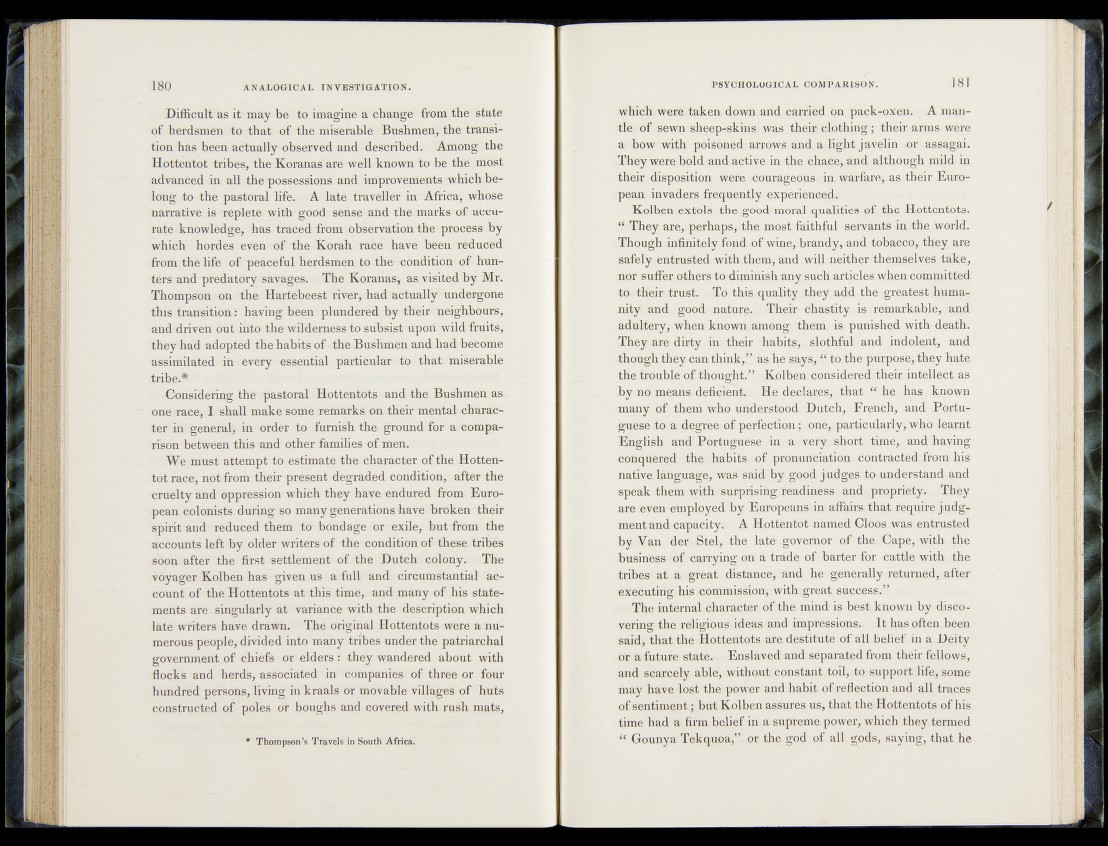
Difficult as it may be to imagine a change from the state
of herdsmen to that of the miserable Bushmen, the transition
has been actually observed and described. Among the
Hottentot tribes, the Koranas are well known to be the most
advanced in all the possessions and improvements which belong
to the pastoral life.* - "A late traveller in Africa, whose
narrative is replete with good sense and the marks of accurate
knowledge, has traced from observation the process by
which hordes even of the Korah race have been reduced
from the life of peaceful herdsmen to the condition of hunters
and predatory savages. The Koranas, as visited by Mr.
Thompson on the Hartebeest river, had actually undergone
this transition: having been plundered by their neighbours,
and drivenout into the wilderness to subsist upon wild fruits,
they had adopted the habits of the Bushmen and had become
assimilated in every essential particular to that miserable
tribe.*
Considering the pastoral Hottentots and the Bushmen as
one race, I shall make some remarks on their mental character
in general, in order to furnish the ground for a comparison
between this and other families of men.
We inust attempt to estimate the character of the Hottentot
race, not from their present degraded condition, after the
cruelty and oppression which they have endured from European
colonists duiing so many generations have broken their
spirit and reduced them to bondage or exile, but Trom the
accounts left by older writers of the condition of these tribes
soon after the first settlement of the Dutch colony. The
voyager Kolben has given us a full and. circumstantial account
of the Hottentots at this time, and many of his statements
are singularly at variance with the description which
late writers have drawn. The original Hottentots were a numerous
people, divided into many tribes under the patriarchal
government of chiefs or elders : they wandered about with
flocks and herds, associated in companies of three or four
hundred persons, living in kraals or movable villages of huts
constructed of poles or boughs and covered with rush mats,
* Thompson’s Travels in South Africa.
which-were taken down and carried on pack-oxen. A. mantle
.of. sewn sheep-skins was their, clothing; their arms were
a- bow with poisoned, arrows and arlighjtJavelin or assagai.
They were bold and,active; in the,, chace, and although mild in
their disposition were courageous^*in. warfare, ag-dhei^European
invaderSifrequently experience^ ,
Kolben extols the,<goodf]^oraf qualities >©/ the Hottentots.
‘f They are, perhaps, fajth%| Servants in the world1.
Though infinitely fond, of .wine,,-brandy, and tobacco,* they .are
•Safely entrusted with them*, and will .neither themselves take,
nor suffer others tbdiminish any such aftic|o$.when;cd'lumitted
to their trust. To this quality they add theag^ad^t hama-
.nity and good nature. Their chastity i is < remarkable, an d
adultery, when known among them is punished; with deiafh-
They are dirty in,.their habits, slothful and indolent, and
though they scan .think,” as, he says^“ to the>p.urposeithey h§|,e,
the trouble of thought. ’ ’ Kolben; considered1 their inteUgfh as
Jby*,np me&hs^defieient. He declares, th a t.“ he h a s; known
manyvsof them who understood Dutch,, French) ,;andfPortu-
guese to a >;degree.!.of perfection,jcone,..particularly, who learnt,
English and Portuguese in as very short time,;, and k^png
conquered* the; habits*.of pronunciation .contractedffrom^hig
native1 language, was said by good j udges» to^understand and
spe&k fheio with -surprising readiness^and propriety^ ..They
are even employed by Europeans in affairs that require judgement
and capacity. A Hottentot named Gloos .was entrusted
by Van der Stel, the late governor of ,the Gape, with the
business of carrying on a trade of barter for cattle with the
tribes at a great distance) and he, generally', returned,; after
executing his commission, with great
The internal character of.the mind is best known by; discovering
the religious ideas and impressions.. It has often been
said, that the Hottentots are destitute of all belief in a Deity
or a future state. Enslaved and separated from their .fellows,
and scarcely able, without constant toil, to; support ,life, some
may have lost the power and habit of reflection and all traces
of sentiment; but Kolben assures us, that the Hottentots of his
time had a firm belief in , a supreme power, whichf.they termed
“ Gounya Tekquoa,” or the god of all gods> saying, that he